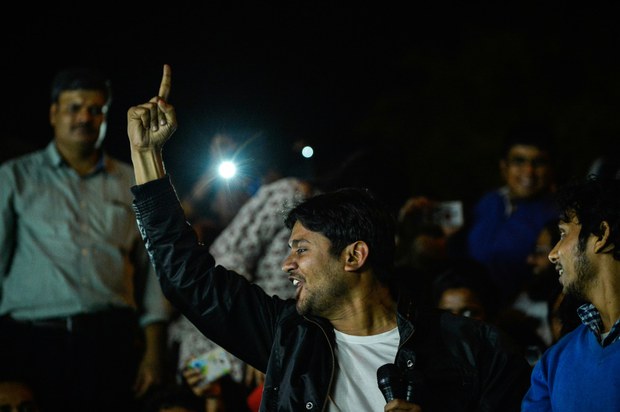India: Student Leader in Sedition Case Freed
2016.03.03
New Delhi
 Indian student union leader Kanhaiya Kumar (center) shouts slogans as he addresses a rally at Jawaharlal Nehru University in New Delhi after being released from jail on sedition charges, March 3, 2016.
Indian student union leader Kanhaiya Kumar (center) shouts slogans as he addresses a rally at Jawaharlal Nehru University in New Delhi after being released from jail on sedition charges, March 3, 2016.
An Indian student leader rallied fellow activists at an on-campus demonstration in New Delhi late Thursday, upon his release from jail after nearly three weeks in custody on sedition charges.
Jawaharlal Nehru University student union head Kanhaiya Kumar, along with five other JNU students and a professor at Delhi University, have been charged with sedition for allegedly participating in anti-national sloganeering.
“This government is using students as a political tool. There is no reason to slap sedition charges on academics who question the way of the government,” Kumar told the rally after posting bail and being released from custody.
Kumar is at the center of a controversy that has gripped India since his arrest on Feb. 12. It has led to demonstrations and confrontations between student activists and Hindu nationalist supporters, as well as a debate about free speech in the world’s most populous democracy. Critics have even described the situation as a government attempt to stifle dissent.
Now, the controversy has spilled over into the realm of freedom of the press in India. This past week reports broke about a newswoman from southern India receiving a deluge of threatening and abusive messages from supporters of the country’s right-wing and Hindu nationalist-led government, after she discussed the JNU sedition story on a TV news show Feb. 26.
Sindhu Sooryakumar, chief coordinating editor for south India’s Asianet TV, said she had received “more than 2,000 threatening and abusive phone calls” after she hosted her Malayalam-language program “Cover Story,” which sought to debate Kumar’s arrest on sedition charges.
Kumar was arrested for allegedly partaking in anti-India chanting – a charge he denies – at an event on Feb. 9 to commemorate the death anniversaries of two executed convicts from Kashmir. One of them was found guilty of playing a role in a daring attack on the Indian parliament in 2001.
Kumar was granted conditional bail late Wednesday for want of evidence.
‘Abhorrent threats’
Sooryakumar’s show came under fire for discussing a statement made in parliament by Human Resource Development Minister Smriti Irani. The minister had suggested that JNU students were “anti-national” because a group from the campus had disrespected Durga, a Hindu goddess, in 2014.
However, a report in the Indian Express said that an official with the ruling Bharatiya Janata Party (BJP) – not Sooryakumar – while on the program had quoted a pamphlet that referred to the Hindu Goddess as a sex worker.
According to the New York-based Committee to Protect Journalists (CPJ), police said that Sooryakumar’s phone number was circulated on social media platforms like Facebook and WhatsApp, and the newswoman began receiving a deluge of hostile messages.
Some callers identified themselves as supporters of the BJP and the Rashtriya Swayamsevak Sangh (RSS), the BJP’s ideological mentor, CPJ said, noting that five men linked to right-wing groups had been arrested, as of Monday, for the alleged threats to Sooryakumar.
"I have been getting a call every minute. The main allegation is that I abused Durga, calling her a sex worker," Sooryakumar told the Indian Express. "Most of the abusers called me a prostitute and abused me."
But in a Facebook post on Tuesday, Kummanam Rajasekharan, a BJP leader in south India’s Kerala state, said the ruling party was not involved in the journalist’s large-scale harassment.
On Wednesday, the CPJ issued a statement calling on the Indian authorities to probe the “abhorrent threats” made against Sooryakumar and shield her from them.
“Journalists should feel free to raise questions and foster debate, including during times of controversy, without fear of reprisal,” said Sumit Galhotra, a senior research associate for CPJ’s Asia program.
‘We are not anti-national’
In his post-release address to hundreds of anxious JNU students on Thursday night, Kumar – who was released on condition that he must not take part in anti-national activities pending police investigation – said he was sad that he would have to wait three more years for the current BJP government to complete its term.
“We want freedom in India, not from India,” he said, as the crowd chanted after him in chorus. “We want freedom from hunger, from poverty and caste-ism.”
“We are not anti-national, we are patriotic liberals,” he added.







